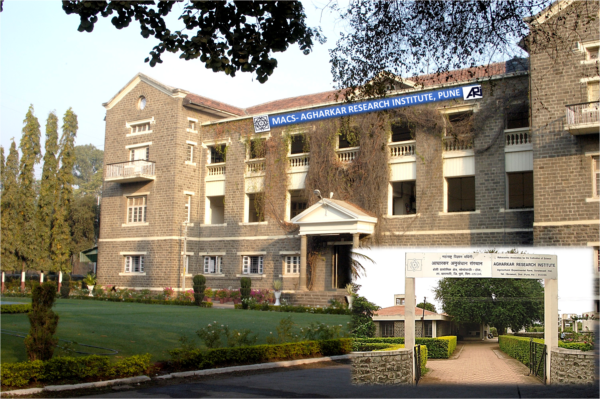Pune
 Name of the centre : Agharkar Research Institute, Pune
Name of the centre : Agharkar Research Institute, Pune
Year of Start : 1946, All India Co-ordinated Project on Wheat Improvement:1974
University / Department: Genetics group, Plant Science Division, Agharkar Research Institute, Pune
Importance of centre and mandate:
Agharkar Research Institute (ARI) was established in 1946 as Maharashtra Association for the Cultivation of Science (MACS). The institute initiated its research activities in wheat as early as 1954 with an ad-hoc project from ICAR on “Inter-specific and Inter-generic hybridization in tetraploid Triticum species”. This was followed by another project on “Genetics and Breeding of Emmer Wheats” which continued till 1972. In the 7th Plan Program, this Institute was included as one of the All India Coordinated Wheat Project center.
Wheat research at ARI is aimed at developing high yielding, disease resistant wheat (T. aestivum, T. durum and T. dicoccum) varieties for India in general and peninsular zone in particular. As a part of all India co-ordinated wheat improvement project, wheat trials on breeding, agronomy, crop protection and physiology of national and international importance are successfully being conducted since inception of centre.
Research work on wheat improvement is being prioritized for the farmers need and end use quality requirement with specific objectives. So for, twelve outstanding commercial wheat varieties (seven durum, four bread and one dicoccum) were notified for cultivation for rainfed as well as irrigated conditions of Peninsular Zone and North East Plain Zone.Production of breeder seed is done as entrusted by ICAR/Central or State Government. Institute is also engaged in successful implementation of front line demonstration (FLD) programme at farmer’s field as approved component of Department of Agriculture, Cooperation & Farmers Welfare (DAC&FW) for newly released wheat varieties along with the improved production technologies. The institute maintains two farms near Baramati, Hol and Songaon with good facilities for the conduction of field experiments and breeder seed production. Additionally, there is well equipped laboratory for quality, molecular biology and tissue culture and also the equipments for wheat physiological studies.
Wheat Varieties Developed by MACS – Agharkar Research Institute (ARI), Pune
| Variety | Species | Year Notified | Pedigree/ Parentage | Released
by |
Zone/
Area of adoption |
Condition | Potential
yield (t/ha) |
Average
yield (t/ha) |
| MACS 9 | T. durum | 1978 | N59 (T.dur)/F183 (T.Pol) | CVRC | PZ | TS – RF | 2.81 | 2.00 |
| MACS 1967 | T. durum | 1987 | GULAB/CPAN 1471 | CVRC | PZ | TS – RF | 2.11 | 1.31 |
| MACS 2496 | T. aestivum | 1991 | SERI”S” | CVRC | PZ | TS – IR | 6.50 | 4.00 |
| MACS 2694 | T. durum | 1997 | MEXICALI/RAJ 1555//
MACS 2130 |
SVRC | MS | TS – IR | 5.00 | 4.05 |
| MACS 2846 | T. durum | 1998 | CPAN 6079/MACS 2340 | CVRC | PZ | TS – IR | 4.50 | 3.50 |
| MACS 3125 | T. durum | 2003 | RAJ 1555/CPAN 6120 | SVRC | MS | TS – IR | 5.20 | 4.84 |
| MACS 6145 | T. aestivum | 2005 | C 306 + Lr 28 | CVRC | NEPZ | TS – RF | 3.70 | 2.55 |
| MACS 2971 | T. dicoccum | 2009 | KTR 5 *2/NP 200 | CVRC | PZ | TS – IR | 6.20 | 5.02 |
| MACS 6222 | T. aestivum | 2010 | HD 2189*2//MACS 2496 | CVRC | PZ | TS – IR | 6.09 | 4.77 |
| MACS 6478 | T. aestivum | 2014 | CS/Th.sc//3*PVN/3MIRLO
/BUC/4/MILAN/5/TILHI |
CVRC | PZ | TS – IR | 6.57 | 4.50 |
| MACS 3949 | T. durum | 2017 | STOT//ALTAR 84/ALD/3/ THB/CEP7780//2*MUSK_4 | CVRC | PZ | TS – IR | 5.35 | 4.39 |
| MACS 4028 | T. durum | 2018 | MACS 2846/BHALEGAON3*2 | CVRC | PZ | TS – RF | 2.87 | 1.93 |
Mandate:
- Conduction and co-ordination of national and international trials/nurseries through multidisciplinary research approachfor developing and identifying superior wheat varieties with better quality and tolerance to biotic and abiotic stresses
- Utilizing germplasm lines and promising cultures in hybridization program to develop high yielding disease resistant wheat varieties with better quality attributes for Peninsular Zone
- Utilization of the Indian and exotic germplasm to enhance drought and heat tolerance
- Standardization of the package of practicesor production technologies for wheat cultivation under Peninsular Zone
- Location-specific resource conservation technologies (RCTs) for enhancing the productivity and profitability of wheat in the region
- Assessment/ development of climate resilient wheat varieties
- Screening of wheat genotypes from nationaltrials and segregating population developed at centre for leaf rust, stem rust and foliar blight
- Testing wheat genotypes for race specific as well as race nonspecific adult plant resistance to leaf and stem rust
- Survey and surveillance for wheat diseases particularly leaf and stem rust as well as foliar blight
Research outreach program:
• Implementation of front line demonstration (FLD) programme for newly released wheat varieties along with the improved production technologies
• Organization of Choupal Pradarshan Khets (CPK)through Public Private Partnership (PPP) with ITC aiming at rapid dissemination of technologies which helps for smooth flow of seed supply to industry.
• Organising Kisan Mela and farmers training programmes.
• Production and supply of breeder seed as entrusted by ICAR/Central or State Government to State seed corporations, NSC, TSF, Farmer producing companies and Private seed companies.
Scientist Details :
| Name | Designation | Phone | Photograph | |
| Dr. Yashavanthakumar K J | Scientist B (Jr. Geneticist) and Incharge AICRP
(AICRP on W & B funded) |
9972842610 (M) 02112 282164 (O) |
yashavanthak@aripune.org yashavant.17@gmail.com |
 |
| Dr. V.S. Baviskar | Scientist B ( Jr. Agronomist)
(AICRP on W & B funded) |
8374174797 (M) 02112 282164 (O) |
vsbaviskar@aripune.org vijendra22kar@gmail.com |
 |
| Dr. Sudhir Navathe | Jr. Pathologist (Scientist B)
(AICRP on W & B funded) |
9889516054(M) | snavathe@aripune.org sudhir.agro123@gmail.com |
 |
